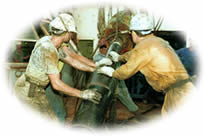The American Standard of Living – For Better or For Worse

Is the distribution of income in the United States becoming more unequal? Does the average American today have a higher or lower standard of living than the average American of a generation ago? Will the next generation have a higher or lower standard of living?
Introduction
 Is the distribution of income in the United States becoming more unequal? Does the average American today have a higher or lower standard of living than the average American of a generation ago? Will the next generation have a higher or lower standard of living than today’s generation? In this Economic Minute, Peter Passell of The New York Times argues that although labor still captures about two-thirds of national income, only skilled workers have benefited. On the other hand, W. Michael Cox and Richard Alm of the Federal Reserve Bank of Dallas argue that "by harnessing the natural power of income distribution, free markets have routinely brought the great mass of Americans products once beyond even the reach of kings."
Is the distribution of income in the United States becoming more unequal? Does the average American today have a higher or lower standard of living than the average American of a generation ago? Will the next generation have a higher or lower standard of living than today’s generation? In this Economic Minute, Peter Passell of The New York Times argues that although labor still captures about two-thirds of national income, only skilled workers have benefited. On the other hand, W. Michael Cox and Richard Alm of the Federal Reserve Bank of Dallas argue that "by harnessing the natural power of income distribution, free markets have routinely brought the great mass of Americans products once beyond even the reach of kings."
Learning Objectives
- Analyze the standard of living for the average American.
- Compare the current average American standard of living to the standard of living of the past.
Resource List
-
The New York Times article (August 1998): Economic Scene; Rich nation, poor nation. Is anyone even looking for a cure?
https://www.nytimes.com/1998/08/13/business/economic-scene-rich-nation-poor-nation-is-anyone-even-looking-for-a-cure.html?mtrref=undefined&gwh=5AE9D6EC204AC2D18B1339A8087247C1&gwt=pay
-
Federal Reserve Bank of Dallas: 1997 Annual Report—Federal Reserve Bank of Dallas. The Declining Real Cost of Living in America.
https://www.dallasfed.org/~/media/documents/fed/annual/1999/ar97.pdf
Process
Go to The New York Times , and read the article by Peter Passell, "Rich Nation, Poor Nation. Is Anyone Even Looking for a Cure?"
Answer these questions based on the article.
- Who has received the benefits of economic growth during the past quarter century? [Educated, skilled, and affluent workers have received the benefits of economic growh during the past quarter century.]
- According to the Rand Corporation, what happened to the real income of the bottom tenth of American families between 1973 and 1995? [The real income of the bottom tenth of American families fell by 13% between 1973 and 1995.]
- Why should we be concerned by a more unequal distribution of income? [A more unequal distribution of income increases the conflict in society and could be considered a failing of capitalism.]
- Why do some economists believe this trend is of little concern? [Some economists argue that inequality of consumption is less than inequality of income. There is upward mobility of the poor so the same people do not stay poor. Also, government programs offset the inequality of income.]
- After reading this article, do you feel the American standard of living is getting better or worse? [Answers may vary, but Passell feels it has become worse for many Americans.]
Now go to the https://www.dallasfed.org/~/media/documents/fed/annual/1999/ar97.pdf, and read "Time Well Spent" by W. Michael Cox and Richard Alm. This publication shows how much time it takes at an average hourly wage to buy a variety of goods and services today and yesterday.
-
Go to page 7, "Our Daily Bread." What has happened to the number of minutes worked to buy food between 1919 and 1997? [The number of minutes worked to buy food between 1919 and 1997 has decreased.]
-
Go to page 6, "Gimme Shelter." What has happened to the amount of hours worked per square foot of housing between 1956 and 1996? [The amount of hours worked per square foot of housing between 1956 and 1996 has decreased from 6.5 hours per square foot to 5.6 hours per square foot.]
- Go to pages 18-19. What has happened to the work time spent to buy the products on this page? [The work time spent to buy the products has decreased dramatically over time.]
Conclusion
-
When you read the data, do you feel the American standard of living is getting better or worse? [It is getting better.]
-
Could the Peter Passell conclusion and the W. Michael Cox and Richard Alm article both be correct? [Yes. Life could be getting worse for the lowest income segment of the U.S. population while it is getting better for the average person.]
- What can you do to improve your future income and standard of living? [Get more education and more skills.]